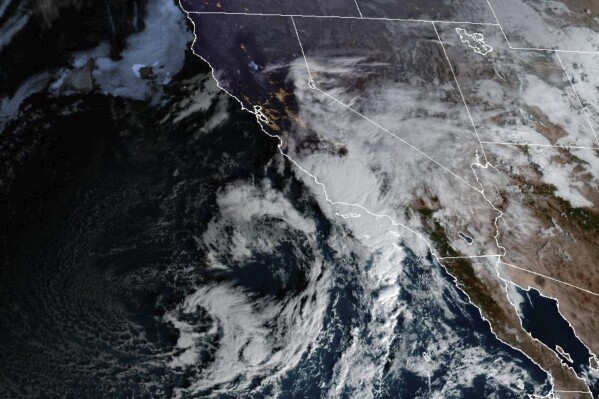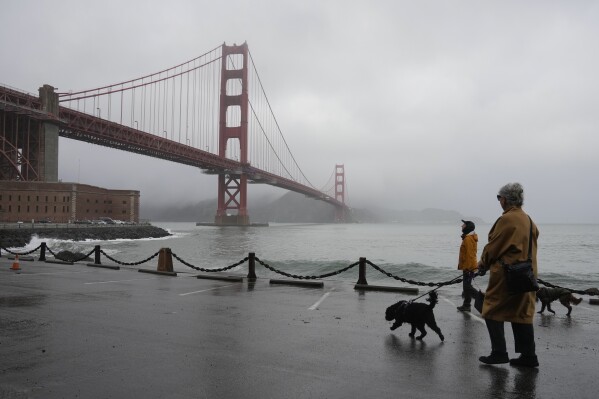Strong winds from Storm Pia disrupt holiday travel in the UK as Eurostar hit by unexpected strike
LONDON (AP) — High winds from Storm Pia on Thursday grounded flights in parts of the U.K., suspended train service and stopped Scottish ferries in a preview of holiday travel disruptions likely to hit northern Europe as the storm moved east.
Meanwhile, in a development unrelated to weather, a surprise strike by French workers added to the travel chaos by shutting down Eurostar trains between London and Paris, leaving thousands of travelers stranded.
Powerful gusts knocked out power to tens of thousands of homes in northern England, toppled a truck on a highway in Manchester, tore part of the roof off an apartment building in Sheffield and — in a bit of good news — helped generate a record amount of electricity.
A gust of 115 mph (185 kilometers per hour) was recorded on Cairngorm Summit in the Scottish Highlands as the national meteorological service warned of winds up to 80 mph (128 kph) in northern Scotland and 55 mph (88 kph) in northern England and Northern Ireland. There was also an ice and snow warning for the Shetland Islands, where schools were closed.



The storm struck as travelers took to the roads, rails and skies to get ahead of holiday traffic expected to peak Friday.
As wind warnings expired Thursday afternoon, the storm bore down on Europe and was expected to bring similar troubles there.
Amsterdam’s Schiphol Airport warned that “a significant number of flights” would be delayed or canceled due to the high winds.
Dutch authorities closed a number of storm barriers on major rivers as a precaution due to high water levels.
The storm was expected to reach southern Sweden on Thursday evening with a thunderstorm, heavy snowfall and poor visibility across the region, the Swedish Meteorological and Hydrological Institute said.
In Germany, national railway operator Deutsche Bahn said there were delays and cancelations to trains in Schleswig-Holstein and Lower Saxony, the two biggest states on the North Sea coast. Lines affected included those from Hannover to Berlin and Frankfurt, and from Hamburg to and from western Germany and Denmark.
The Federal Office for Shipping and Hydrography warned of a possible storm surge Thursday evening on the North Sea coast, which could bring water levels up to 2.5 meters (8.20 feet) higher than mean high tide. Some ferries to or from North Sea islands were canceled for Thursday or Friday.
In the U.K., gusts knocked down trees that blocked roads and struck power lines, causing blackouts to 40,000 households in northeast England, energy company Northern Powergrid said.
A driver was hospitalized when a tree crashed onto his car in Clifton, Derbyshire.
The winds generated a record of 21.8 gigawatts of electricity, supplying 56% of all the power that was being used from the grid in Great Britain between 8 and 8:30 a.m., National Grid Electricity System Operator said. It surpassed the previous record of 21.6 gigawatts.
British Airways grounded two dozen flights, British broadcaster Sky News reported. A spokesperson for the airline did not provide further details but issued a statement saying it apologized to customers for having to “make some adjustments” to its schedule.
National Rail said speed restrictions for trains were in place across Scotland, and parts of England and Wales. ScotRail said it suspended service on some of its lines, and TransPennine Express asked train passengers to delay their journeys in and out of Edinburgh through most of the day.
Ferry operator CalMac canceled its service to 22 islands off the west coast of Scotland.
Disclaimer: The copyright of this article belongs to the original author. Reposting this article is solely for the purpose of information dissemination and does not constitute any investment advice. If there is any infringement, please contact us immediately. We will make corrections or deletions as necessary. Thank you.






